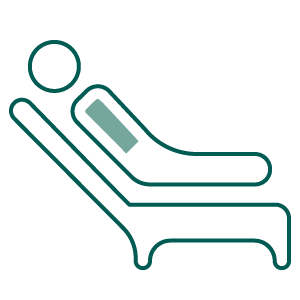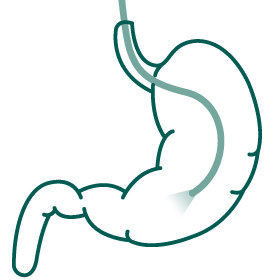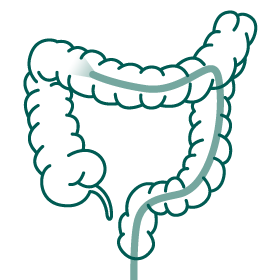A non-invasive liver scan to assess your liver health
Liver disease can be a silent killer, and it may be well advanced before you notice any symptoms. Thankfully, we can initially assess your liver health without the pain and discomfort of a biopsy. If you have high-risk factors or are experiencing symptoms of liver disease, then a FibroScan® (liver scan) can help to assess the presence and level of liver damage or disease.
A FibroScan® is used to assess liver steatosis (liver fat) and fibrosis (liver damage or scarring) and provides additional information that cannot be obtained from regular liver imaging, like an ultrasound. The results will help your doctor to understand your liver steatosis (fat) and fibrosis (scarring) and, therefore, the overall health of your liver and, if needed, to formulate a management plan.
The liver scan process
- Before
- During
- After
The liver scan test is performed in a standard consultation room and takes approximately 15 minutes to complete.
What is a FibroScan®, and how does it work?
A FibroScan® is a noninvasive machine that uses advanced ultrasound technology called transient elastography to measure and assess the level of stiffness (fibrosis or scarring) in the liver, liver steatosis (fatty liver disease), and for any suggestion of clinically significant portal hypertension.
During your FibroScan®, a probe is gently held against your skin over your liver and generates a gentle pulse wave that measures your liver stiffness and fat content.
Why do I need a FibroScan®?
Your doctor might request a liver scan if there is a concern about liver damage. FibroScan® can be used to help diagnose, assess or monitor the progression of liver disease, such as:
- Non-alcoholic fatty liver disease/steatohepatitis
- Alcoholic liver disease
- Nonalcoholic steatohepatitis (NASH)
- Viral hepatitis (hepatitis B or Hepatitis C)
- Hemochromatosis (over storage of iron)
- Autoimmune Hepatitis
- Cirrhosis
- Genetic Diseases (such as Hemochromatosis and Wilson’s Disease)
Your liver stiffness reading from a liver scan can be used to:
- estimate the existing degree of liver damage
- monitor disease progression or regression via serial measurements
- guide the prognosis and further management of liver disease, including treatment.
How should I prepare for a FibroScan®?
You will need to fast for at least 3 hours before your liver Fibroscan, but clear fluids are ok to continue during this time. Wear comfortable clothing to your appointment that can be easily moved/repositioned to allow us to examine your right upper abdomen.
You may keep taking all your current medications as directed by your doctor.
Where can I get my FibroScan® done?
Dr Bloom and Dr Braude can perform your liver scan at any of the following locations:
- Holmesglen Private Hospital, Moorabbin
- Cabrini Hospital
- The Emeline Medical Centre, Malvern
- Sandy Hill Medical Centre, Sandringham
- Inkerman Medical Group, Kilda East
- Masada Private Hospital, St Kilda
Will it hurt?
No, it will not hurt. You might feel a slight vibration from the probe as it takes the measurements.
How long does it take to complete a liver scan?
Your FibroScan® will take around 15 minutes to complete.
When will I receive my scan results?
Dr Bloom and Dr Braude will explain your results during your consultation and provide a written report at the end. A copy will also be sent to your referring doctor/practitioner.
For Doctors and practitioners
FibroScan®, or liver scan, is a well-researched and supported noninvasive method of examining and assessing the liver health of your patients. The test will deliver a liver stiffness and steatosis reading, which can be used to:
- estimate the existing degree of liver damage
- monitor disease progression or regression via serial measurements
- guide the prognosis and further management of liver disease, including treatment.
The liver scan FibroScan® can be used to help diagnose, assess or monitor the progression of liver disease, such as:
- Non-alcoholic fatty liver disease/steatohepatitis
- Alcoholic liver disease (alcoholic hepatitis
- Viral hepatitis (hepatitis B or Hepatitis C)
- Hemochromatosis (over storage of iron)
- Autoimmune Hepatitis
- Genetic Diseases (such as Hemochromatosis and Wilson’s Disease)
- Can help guide evaluation and management of clinically significant portal hypertension
What are the advantages of Fibroscan® testing compared to liver biopsy?
FibroScan offers multiple benefits over a liver biopsy:
- It is non-invasive
- It is painless
- No local or general anaesthetic is required
- It is more time-efficient – can be performed during the consultation
- It has not been associated with any side effects
- The results are immediately available
- Proven effective liver evaluation.
** In some cases your specialist may also recommend a liver biopsy if further diagnostic information is needed.
What do Fibroscan® scores mean?
The higher your score, the more likely your liver has fibrosis.
- 5 – 7.4 suggests minimal fibrosis
- 7.5 – 9.4 suggests moderate fibrosis
- 9.5 or higher suggests severe fibrosis
** Please note these scores may vary depending on the cause of your liver disease, your GMS specialist will help to interpret your results at the time of your consultation.
Are there any FibroScan® contraindications for patients?
No, FibroScan® can be performed on almost all patients. If you have any specific concerns please discuss with your GMS specialist if you have any questions.
What clinical evidence is available supporting FibroScan®?
FibroScan® is recognised worldwide as the non-invasive measure for gold standard solution for liver fibrosis and liver steatosis assessment, with more than 4,200 peer-reviewed publications. Publications include clinical studies on liver stiffness and methotrexate, PBC/PSC and haemochromatosis. These can be reviewed in the Echosens Clinical Library.







